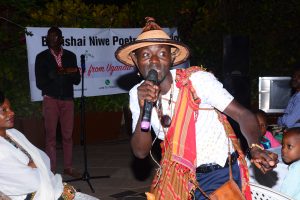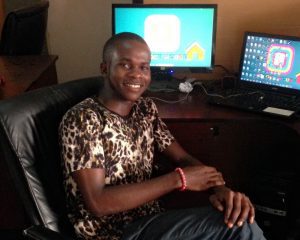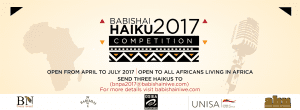The Babishai Niwe Poetry Foundation is at the centre of learning and unlearning about the African Haiku. Cofounder of the Africa Haiku Network, Emmanuel Jessie Kalusian, also judge of the #Babishai2017 Haiku prize, is editor of the Mamba Journal.
Courtesy photo
Q: Mr. Kalusian, describe the African haiku, using an African haiku.
1) Well I would say African haiku is the sort of haiku that is inspired by Africa’s rich sights and sounds, cum cultures and beliefs.
It is also the type of haiku that uses African season words or kigo as it is called in Japanese. Some of these African season words include ‘harmattan moon’, ‘harmattan season’, ‘harmattan wind’, ‘mango harvest’, etc. In the meantime there is a saijiki, created a Kenyan lady, which contains a list of African season words. Now to show what an African haiku looks like: here’s one i composed which has been published by Red Moon Press in her 2016 anthology.
thunderclaps
the village priest
hears his name
(c) Emmanuel Jessie Kalusian
Q: After three editions of the Mamba journal, share with us the journey of publishing haikus.
2) The journey of publishing haiku is a very exciting one. Couple of years back, the first time my haiku was published, i recall that night i couldn’t sleep for the joy. Even now, many years later i still feel excited as more of my haikus are published.
Q: How do your readers respond to the Mamba journal?
3) To say the least, our readers are very excited about African haiku and the Mamba journal. This is shown in the appraisal letters we receive just after an issue is published.
Q: Are haikus possible in African languages?
4) Of course they are possible in African languages. My friend, Mr.
Baah has published haikus in Twi and is planing another translation in Igbo. So I can doubtless say haikus are possible in African languages; in fact their translation should be encouraged.
Q: Do you feel it’s necessary to popularize the African Haiku (Afriku)?
5) Of course it is necessary to popularize African haiku, because haiku itself is a relatively new genre in the shores of Africa. Matter of fact, Africa Haiku Network is currently running programs geared towards popularizing haiku in Africa.
Q: What was your most recent wow moment in your writing?
6) My recent wow moment was the publication of the haiku which i shared in the prestigious Red Moon anthology. I just wasn’t expecting it. It came as a complete surprise.
Q: What’s the last book you read?
7) I love books and I read voraciously. As to what I’m reading right now? I’m currently reading a novel by Russian literary giant Tolstoy.
Q: Who is the first person you go to when you find yourself in a moment of literary enthusiasm, which you need to share?
8) Well naturally there’s no person in particular I share such moments with. When they come, I simply share it with writing friends on Facebook and anyone around.
Q: If the Afriku were a drink, what would it be?
9) Yummy! Yummy! It would taste like coffee. Just to say i like coffee a lot because it keeps me awake as i write through out the night.
Thank you.



